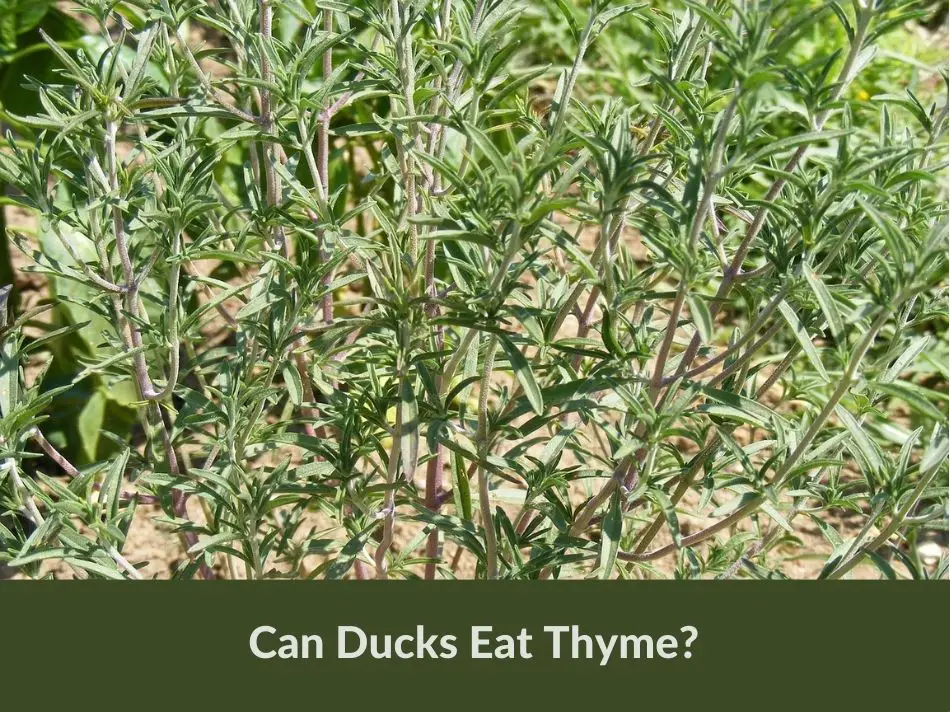Ducks are versatile eaters. In the wild, their diet predominantly consists of aquatic plants, small fish, insects, and algae. Domestic ducks have a similar penchant, with an added mixture of poultry pellets. Both wild and domestic ducks are known to be dabblers, skimming the water’s surface for morsels. But, can ducks eat thyme?
Yes, ducks can eat thyme. It contains several healthy vitamins and minerals, making thyme a great snack for ducks. But, not only that, thyme can also add some great flavor to the duck’s diet.
In this article, we explore the compatibility of thyme with a duck’s diet. Delving into the dietary habits of ducks, we’ll determine if thyme is a suitable treat, its frequency of consumption, and the potential health benefits it offers.
How Often Can I Feed My Ducks Thyme?
Ducks thrive on a balanced diet. Think of thyme as a garnish rather than a main dish. Once or twice a week in small quantities should suffice. Too much of any herb or spice might disrupt their digestive system, so moderation is the name of the game.
Can Ducklings Eat Thyme?
Ducklings, with their growing bodies, have slightly different dietary needs. While thyme isn’t harmful to them, it’s more beneficial to focus on providing them with food rich in proteins and other essential nutrients during their early days.
Once they mature a bit, introducing thyme occasionally should be fine.
Nutritional Value Of Thyme For Ducks
Thyme, both loved in human dishes and now duck treats, has some impressive nutritional credentials:
- Vitamins: Particularly rich in Vitamin C, it supports the immune system. The presence of Vitamin A helps in vision and cellular growth.
- Minerals: Thyme contains calcium, which is vital for bone health, especially in growing ducklings. It also has trace amounts of iron, manganese, and potassium.
- Antioxidants: Thyme is abundant in antioxidants, which helps combat oxidative stress and supports overall health.
- Anti-inflammatory Properties: This means it can help with minor inflammations that ducks might experience.
- Fiber: It aids in digestion, ensuring that the ducks have a smooth digestive process.
While thyme offers these benefits, remember that ducks get their primary nutrients from their usual diet, making thyme a delightful supplementary treat.
How To Feed Thyme To Ducks
Whether fresh or dried, there are fun ways to offer thyme:
- Fresh Thyme: Offer it raw. Rinse it well to remove any contaminants and sprinkle it over their food or let them pick at it.
- Dried Thyme: Sprinkle a small amount over their regular food. It’s a more concentrated flavor, so use it sparingly.
- Thyme Stalks: These are a fun option. Ducks can pick off the leaves, providing both a snack and a bit of entertainment.
- Mixed with other treats: Consider mixing thyme with other duck-approved veggies or fruits for a gourmet duck treat.
And always accompany food with plenty of water. This aids in the digestion of thyme and keeps the ducks hydrated.
More Herbs Ducks Can Eat
Apart from thyme, ducks can indeed relish a range of other herbs that not only provide a delightful taste but also deliver nutritional benefits. Herbs can serve as natural remedies, antioxidants, and sources of vitamins for our feathered friends.
Below is a collection of more herbs ducks can eat:
Be sure to explore our comprehensive list of plants and flowers suitable for ducks.
Conclusion
Feeding ducks can be a delightful experience, whether you’re a dedicated caretaker or a park visitor. Introducing thyme to their diet can not only offer a change of pace but also some health benefits.
That said, it’s essential to remember that thyme should be an occasional treat and not a staple in their diet. When given in moderation, it can be a tasty and nutritious addition to their meals.
So next time you’re out and about with some thyme on hand, why not share a sprig or two with our quacking friends? They might just quack a thank you!
Disclaimer: The information in this article is for informational purposes only. I'm not an expert or a veterinarian.


